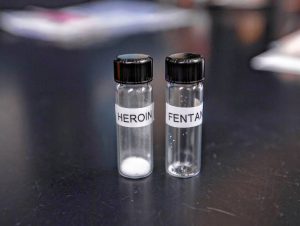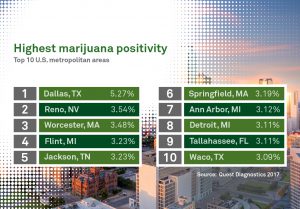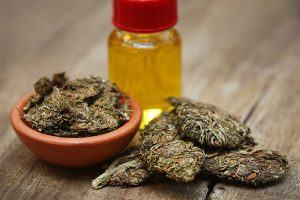 Marijuana continues to be the most commonly detected illicit drug, according to the Quest Diagnostics Drug Testing Index™ (DTI) analysis of urine drug tests. Marijuana positivity in the combined U.S. workforce increased 6.2%, to 1.7%in 2013 compared to 1.6%in 2012. In the safety-sensitive workforce, marijuana positivity increased 5.6% (0.67% vs. 0.63%). In the general U.S. workforce, the positivity rate increased 5%, to 2.1% in 2013 compared to 2.0% in the prior year. These increased positivity rates are consistent with findings from the 2012 National Survey on Drug Use and Health (NSDUH), which showed an increase in self-reported past-month marijuana use between 2007 and 2012.
Marijuana continues to be the most commonly detected illicit drug, according to the Quest Diagnostics Drug Testing Index™ (DTI) analysis of urine drug tests. Marijuana positivity in the combined U.S. workforce increased 6.2%, to 1.7%in 2013 compared to 1.6%in 2012. In the safety-sensitive workforce, marijuana positivity increased 5.6% (0.67% vs. 0.63%). In the general U.S. workforce, the positivity rate increased 5%, to 2.1% in 2013 compared to 2.0% in the prior year. These increased positivity rates are consistent with findings from the 2012 National Survey on Drug Use and Health (NSDUH), which showed an increase in self-reported past-month marijuana use between 2007 and 2012.
An analysis of urine drug test data for the combined U.S. workforce from the two states with “recreational” use laws – Colorado and Washington – showed marijuana positivity rates increased 20 and 23%, respectively, in the general workforce between 2012 and 2013, compared to the 5% average increase among the U.S. general workforce in all fifty states. However, both Colorado and Washington experienced dramatic increases in marijuana positivity rates prior to legalization at the end of 2012. From 2009 to 2010, Colorado experienced a 22% increase and Washington a 10% decline in positivity. From 2011 to 2012, Colorado experienced a 3% increase and Washington an 8% increase in positivity.
“Washington and Colorado are believed by many to foreshadow future trends in ‘recreational’ marijuana use. While Quest’s Drug Testing Index shows dramatic spikes in marijuana positivity rates over the past year, a longer view of the data suggests a more complex picture,” said Dr. Barry Sample, Director, Science and Technology. “It is possible that relaxed societal views of marijuana use in those two states, relative to others, may in part be responsible for the recent increase in positivity rates. Yet, this doesn’t explain why both states also experienced steep rises – and declines – in positivity in recent years. We will be very interested to see how our data evolves over the next year or two in these two states relative to those that have not legalized so-called ‘recreational’ marijuana.
“What we do know is that workforce positivity for marijuana is definitely on the rise across the United States. It is important for people to remember that while some states have legalized marijuana, the federal government has not. Employers generally have the authority to restrict the ‘recreational’ use of marijuana by employees and impose sanctions, including termination, on employees with positive drug tests in all 50 states,” added Dr. Sample.
For more information, visit QuestDiagnostics.com/DTI.
 Your Privacy Choices
|
Privacy Notices
|
Terms
|
Language Assistance / Non-Discrimination Notice | Asistencia de Idiomas / Aviso de no Discriminación | 語言協助 / 不䈚視通知
Your Privacy Choices
|
Privacy Notices
|
Terms
|
Language Assistance / Non-Discrimination Notice | Asistencia de Idiomas / Aviso de no Discriminación | 語言協助 / 不䈚視通知



















An analysis of urine drug test data for the combined U.S. workforce from the two states with “recreational” use laws – Colorado and Washington – showed marijuana positivity rates increased 20 and 23%, respectively, in the general workforce between 2012 and 2013, compared to the 5% average increase among the U.S. general workforce in all fifty states. However, both Colorado and Washington experienced dramatic increases in marijuana positivity rates prior to legalization at the end of 2012. From 2009 to 2010, Colorado experienced a 22% increase and Washington a 10% decline in positivity. From 2011 to 2012, Colorado experienced a 3% increase and Washington an 8% increase in positivity.
“Washington and Colorado are believed by many to foreshadow future trends in ‘recreational’ marijuana use. While Quest’s Drug Testing Index shows dramatic spikes in marijuana positivity rates over the past year, a longer view of the data suggests a more complex picture,” said Dr. Barry Sample, Director, Science and Technology. “It is possible that relaxed societal views of marijuana use in those two states, relative to others, may in part be responsible for the recent increase in positivity rates. Yet, this doesn’t explain why both states also experienced steep rises – and declines – in positivity in recent years. We will be very interested to see how our data evolves over the next year or two in these two states relative to those that have not legalized so-called ‘recreational’ marijuana.
“What we do know is that workforce positivity for marijuana is definitely on the rise across the United States. It is important for people to remember that while some states have legalized marijuana, the federal government has not. Employers generally have the authority to restrict the ‘recreational’ use of marijuana by employees and impose sanctions, including termination, on employees with positive drug tests in all 50 states,” added Dr. Sample.
For more information, visit QuestDiagnostics.com/DTI.